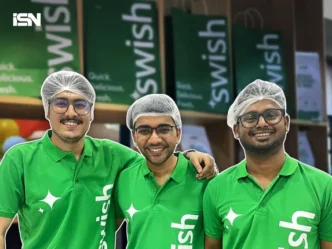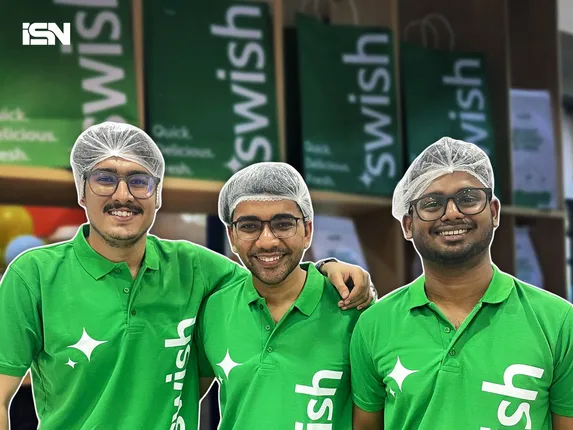Swish funding has become one of the most talked-about developments in India’s fast-moving food delivery space after the young startup secured $14 million in fresh Series A capital. The company, which promises 10-minute food delivery through its dense network of cloud kitchens, pulled this off barely three months after raising its first $2 million. The pace alone shows how quickly investors are betting on its potential.
The new round brought in Rs 122.32 crore, led by Hara Global Capital, with continued backing from Accel India. According to regulatory filings, Swish issued 4,762 Series A preference shares priced at Rs 2,56,334 each, raising close to Rs 112.3 crore. It’s a major milestone for a startup that only launched in 2024 and is already positioning itself as a challenger in India’s growing instant food delivery market.
Hara Global Capital took the largest slice with Rs 69.56 crore, while Accel India added another Rs 52.18 crore. A handful of prominent angels also joined the round. QED Innovation, led by Kunal Shah, invested Rs 20.5 lakh. Unacademy CEO Gaurav Munjal put in Rs 5 lakh. SoftBank’s Sumer Juneja joined with Rs 30.7 lakh. Their participation signals strong belief in the company’s early traction.
After the Swish funding round closed, the company’s valuation jumped to nearly Rs 522 crore, or about $60 million. Filings also show how the ownership structure has shifted. Hara Global Capital now holds 13.33 percent, while Accel India commands 27.24 percent. Co-founders Aniket Sunil Shah, Sureshkumar Sarana, and Ujjwal Sukheja remain significant shareholders with 16.38 percent each, keeping the company founder-driven as it scales.
Swish has built its model around speed, consistency, and proximity. The startup relies on cloud kitchens it calls “delight centers,” placed within tight 1.5 to 2 km delivery zones. Food is prepared fresh and dispatched instantly, reducing waiting time and ensuring a predictable experience. This full-stack setup gives Swish more control over quality, pricing, and delivery time compared to aggregator-led models.
Yet the space Swish is entering is anything but quiet. India’s rapid shift toward instant consumption has triggered fierce competition. Giants like Zomato, Swiggy, and Zepto dominate the landscape, and even Blinkit has rolled out Bistro to push deeper into 10-minute meals. New names like Ola, Magicpin, and Zing have jumped in as well. Rebel Foods, already a cloud kitchen powerhouse, is testing its own quick-service line called QuickiES.
Against this backdrop, the Swish funding round doesn’t just add capital; it reflects investor confidence in how the company is positioning itself. But building a sustainable business in the ultra-fast food delivery space isn’t a simple race for speed. It demands tight operations, high kitchen density, sharp demand prediction, and flawless last-mile execution. Even a minor delay or inconsistency can break the experience for customers who expect near-instant results.
Still, Swish has a few strengths working in its favour. A full-stack model means it doesn’t rely on third-party restaurants. That allows the company to standardize recipes, maintain food safety, and tweak pricing more freely. Even better, it avoids the operational chaos that comes from managing thousands of vendors. This strategy, if executed with precision, can help Swish deliver more consistent meals at scale while keeping costs predictable.
Investors clearly see the potential. Raising $14 million so soon after its seed round shows that the company has been able to demonstrate early promise, both in customer interest and operational readiness. While the instant food delivery sector is crowded, it is also expanding fast as consumers choose convenience over everything else. The real question is how Swish can turn speed into long-term loyalty and how well it can use this new capital to deepen its network.
The next phase will be crucial. Swish will need to fine-tune its kitchen placement strategy, build strong demand in each micro-zone, and improve its delivery workflow as competition heats up. India’s appetite for fast food is only growing, and the companies that succeed will be the ones that deliver reliability at scale without losing control of costs or quality.
Swish funding marks a solid start for the young company, giving it enough firepower to challenge well-funded rivals. Whether it can carve out a lasting space in the 10-minute food delivery race will depend on how quickly it can build operations that match its ambitions. For now, the momentum is on its side, and the new capital gives Swish a chance to prove it can move as fast as the meals it serves.













